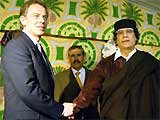What is the definition of good Muslims and a bad Muslims? To the United States bad Muslims it seems, are countries like Iraq (under Saddam Hussein) that killed Kurdish communities in Iraq that tried to form their own independence. Good Muslims on the other hands are countries like Turkey that does the same. The goal of creating a Kurdish country from a Kurdish state may bring problems in the future (oil related) but that’s a story for another day.
Today’s story is of a bad Muslim country that became good - I’m talking about Libya, a country that became independent in 1951 following decades of occupation from the Italian government.
Libya was a Kingdom, and maintained a pro-Western stance. There was a close relationship with America and Britain; both countries maintained military base rights in Libya. The pro western relationship with the non-active part in the Arab-Israeli dispute led to frustrations amongst the citizens.
In 1969, Colonel Gaddafi took over the country in a coup d’état and closed the American and British bases. He also partially nationalised foreign oil and commercial interests in Libya.
He used oil funds during the 1970s and 1980s to promote his ideology outside Libya. He played a key role in promoting oil embargoes as a political weapon for challenging the West, hoping that an oil price rise and embargo in 1973 would persuade the West, especially the United States, to end support for Israel.
But his ideology did not stop there. Libya started committing mass acts of state sponsored terrorism including bombing of a discotheque in Berlin that killed two American servicemen. The United States responded by launching an aerial bombing attack against targets near Tripoli and Benghazi. But that did not stop Libya retaliating. In1988, two Libyan intelligence agents blew up an American airline in Lockerbie, Scotland killing 270 people. The following year a French airline that was scheduled to fly from the Congo to Chad was bombed killing 170 people on board.
The UN Security Council passed a resolution asking Libya to surrender the suspects, cooperate with the Pan Am 103 and UTA 772 investigations, and pay compensation to the victims' families and cease all support for terrorism. Libya's refused and so sanctions were imposed.
The sanctions bought enormous strain to the country and the support for terrorism appeared to have decreased. Colonel Gaddafi quickly began to rebuild his relationships with the west.
The Libyan government announced its decision to abandon its weapons of mass destruction programmes and pay almost 3 billion US dollars in compensation to the families of Pan Am flight 103 as well as UTA flight 772.
UN sanctions were lifted in September 2003 but there are still problems:
(1) Libyan people still do not have the right to change their government. Freedom of speech, press, assembly, association, and religion are restricted. Independent human rights organizations are prohibited.
(2) According to the U.S. Department of State’s annual human rights report for 2004, Libya’s authoritarian regime continued to have a poor record in the area of human rights. Some of the numerous and serious abuses on the part of the government include poor prison conditions, arbitrary arrest and detention, prisoners held incommunicado, and political prisoners held for many years without charge or trial. The judiciary is controlled by the state, and there is no right to a fair public trial. – Sounds a bit like Guantanamo Bay!
With the intension of getting rid of all its WMD, France agreed with Libya to develop a significant nuclear power program.
The US State Department announced that it would restore full diplomatic relations with Libya. The State Department also stated that Libya would be removed from the list of nations that support terrorism.
The UK also made strides offering "a hand in partnership" to states giving up terror and banned weapons. The partnership was so strong that the UK invited Libya to train its military at the Sandhurst military School.
The offer of military cooperation, and the confirmation that British Aerospace have been in negotiations with Libya, has led to speculation that arms deals have been made. Lets hope that the arms sale and military training don’t come back to haunt us directly or indirectly.
Wednesday, August 16, 2006
Bad Muslims Become Good Muslims: Libya
Subscribe to:
Post Comments (Atom)





No comments:
Post a Comment